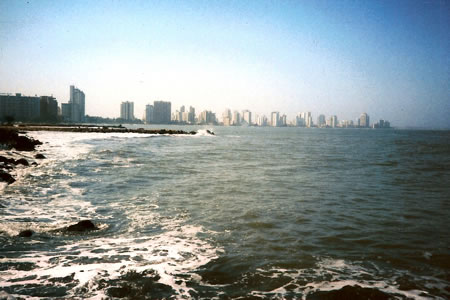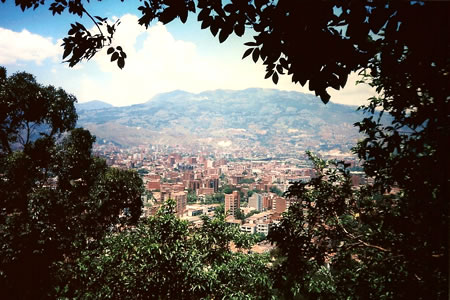English | Dutch |
|
| Locombia | |
Caracas (Venezuela), April 18th 1997 |
|
I am making a journey of three months in Latin America, from Guatemala to Venezuela. On this route, I have to cross Colombia, a country that is often skipped by travellers due to the safety problems. Colombia is by travellers often called Locombia, referring to the Spanish word ‘Loco’, which means ‘mad’. One must be very mad to travel to Colombia. But ok, I am young and like to life on the edge, so I decide to ignore the rumours about Colombia, and bought a ticket via Panama City to the city of Cartagena in northern Colombia. A couple of days later I am approaching Cartagena by air. The city has a beautiful setting. The new part of the city looks like Manhattan. It is located on a tongue of land in the sea, and has a lot of tall buildings. The sea around the tongue of land is beautiful coloured, from light to dark blue, and everything in between. It looks like paradise. However, reality is different. Within a couple of minutes I make my first steps on Colombian property. Did I really make the right decision to come here is the sentence that goes through my head several times? I must confirm that I am a little bit nervous. My visit to Colombia really begins. |
|
 |
|
Skyline of Cartagena |
|
Cartagena is a city that in no way confirms the bad image of Colombia. The city is beautiful, clean, has a lot of students and is very relaxed. The centre of the old city is beautiful and in no way I have the feeling that it is unsafe. Within the first days of my visit to Cartagena I hear that Cartagena is the Costa Brava for Colombian drug barons. The reason is that the drug barons cannot leave Colombia for a holiday elsewhere in the world, because they will be arrested as soon as they arrive somewhere outside Colombia. For that reason, Cartagena is the only nice place to go for them, without the risk of being arrested. For some reason they are save in this city, which makes it a good place to take a break from the hard life in the other parts of the country. I use my days in Cartagena to get used to the idea that I am in Colombia and to collect the courage to travel south to Medellin and Bogotá. I decide to arrange already a visa for Venezuela at the consulate in Cartagena, just to be sure that I can leave Colombia as soon as necessary. In the hotel in Cartagena I meet two other travellers (British guys). They are in the same position as me, so we decided to travel together via Medellin to Bogotá. Two days later we are sitting in the bus to Medellin. Medellin is together with Cali the most famous drug cartel city of Colombia. On the road to Medellin, the bus is often stopped at military checkpoints. The checkpoints must prevent the transport of weapons and drugs through the country. The procedure at the checkpoints is the same. All passengers must leave the bus and must take a position with spread arms and legs against the side of the bus. A couple of soldiers will search the bus for weapons and drugs while the other soldiers will frisk the passengers. The process takes approximately 15 minutes. |
|
 |
|
City centre of Medellin |
|
A couple of kilometres before Medellin, the bus decreases its speed. We drive slowly, to carefully pass an incident that has happened next to the road. A lot op police is involved. I see a dead body in the grass next to the road. I look frightened to my Colombian neighbour in the bus, with the question in my eyes: “what the hell happened here?”. The guy knows that I am not speaking Spanish, so he symbolizes with his hand a gun, and points to his head. Damn, somebody is killed here. None of the Colombian passengers bus seems to be shocked. It is nothing special for them. I turned my head to the two British guys in the back of the bus and said: “welcome to Medellin”. A visit to a Colombian city needs some proper preparation. You have to know before you arrive which parts of the city are save, and which parts must be avoided. This is important for the decision where to look for a hotel, and how to travel from the bus station to the city centre. Crossing the ‘wrong’ parts of the city can be the end of your journey, or even worse, your life. The city centre of Medellin is quite safe during the day. After sunset, you better stay within a couple of meters from your hotel, or take an official taxi if you want something to visit or eat. In Bogotá, the situation is more complex. You must avoid any travelling in the area west to Carrera 10. Even the taxi drivers avoid this part of the city and take a detour if you want to go to a destination that is on the other side of this area. Taking a local city bus can also be dangerous, if you are not aware about the exact route of the bus. During our bus ride from Medellin to Bogotá, we plan carefully the hotel we want to take in Bogotá. We decide to take the youth hostel. The youth hostel is in the centre of the city and is located near the palace of the president. For safety reasons, all streets around the presidential palace are well lit and equipped with armed soldiers, 50 meters apart from each other. This gives us a safe feeling at night on our way back to the hotel, after having some beers in a bar in the city centre. After a couple of days in Bogotá I say goodbye to my fellow travellers. I decided the travel north to the Venezuelan border, while my fellow travellers head south via Cali to the border of Ecuador. The border crossing to Venezuela is very relaxed. On foot I cross the border without having any difficulties. In the city of San Antonio del Táchira I buy a bus ticket to the city of Mérida. I take my seat in the back of the bus, and I have the nice feeling of surviving a visit to Colombia. Just after the bus left the city of San Antonio military people stop the bus for a check. A soldier enters the bus and starts checking the passports of the bus passengers. I am the only foreigner in the bus. After studying my passport, the soldier asks me to leave the bus for a check. He also asks the bus driver to get my backpack from the bus. I go with the soldier and my backpack to a small brick building next to the road. In this building, the soldiers ask me to undress myself. They check me from head to toe without touching me. They also ask me to bend over to be sure they do not miss a thing. It seems to be a standard check for foreign travellers travelling from Colombia to Venezuela. After me being inspected, my backpack is checked. They unroll my sleeping bag on the floor and one of the soldiers is groping my sleeping bag, on his hands and knees, for drugs. After a detailed check of 30 minutes, I am free to get on the bus again. I am happy that the bus decided to wait for me. While entering the bus and walking back to my seat I see that most people in the bus are not happy with this delay. A smile and some excuses seem to help. The bus hits the road again, with next stop Mérida. |
|